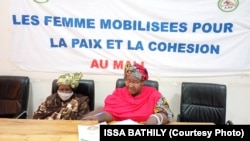On October 31, 2000, the United Nations adopted Resolution 1325, which called on member states to acknowledge and address the disproportionate and unique impact of armed conflict on women and girls. The resolution made clear the need to adopt a gender perspective with respect to the disproportionate effects of conflict and its aftermath on women and girls, including prevention and response to conflict-related sexual and gender-based violence, repatriation, and resettlement, as well as post-conflict reconstruction and the need to meaningfully include women and girls in designing and proposing gender-sensitive solutions.
Today, twenty-two years after the adoption of Resolution 1325, women continue to be excluded from peace and security decision-making processes, which in turn leaves them more vulnerable to disproportionate rates of violence, targeted repression and exclusion from reconstruction, reintegration, and rebuilding decisions post conflict. “We see these same patterns around the world, and especially in areas affected by conflict,” said U.S. Ambassador to the United Nations Linda Thomas-Greenfield at the UN Security Council’s annual open debate on Women, Peace, and Security.
“Right now we face a pivotal moment for the Women, Peace, and Security Agenda. Around the world, women and girls are under threat from conflict and repressive regimes. Under threat from climate and under threat from poverty. Risks have gone up, including the threat of kidnapping, torture, killing, and gender-based violence. Women leaders, human rights defenders and activists are particularly targeted by online threats and harassment and abuse. They are often the subject of disinformation campaigns, designed to intimidate, discredit, and silence their calls for peace.”
“The Women, Peace, and Security Agenda, as outlined by Resolution 1325, offers a transformational vision: A world where women and girls are protected, included, and play an essential role for forging peace,” said Ambassador Thomas Greenfield. “Our charge is to make this vision a reality. Not just in words, but in deeds and actions.”
“We must promote woman’s leadership, whether it’s in their villages, it’s in their capitals, or it’s on the international stage, as we five women members of this Security Council here promote, and the many other women see around this room today.”
“We need to make this critical moment to band together as a global community to not just wear pink today as a sign of our support but raise our voices; raise our voices to demand the change that we know that the women of this world need,” said Ambassador Thomas-Greenfield.
“We have to do it for the girls, and for the women, and for the peace and security that they will bring the world, but also the peace and security that they need to have from the world.”
On Women, Peace, and Security

Women continue to be excluded from peace and security decision-making processes, which in turn leaves them more vulnerable to disproportionate rates of violence, targeted repression and exclusion from reconstruction, reintegration, and rebuilding decisions post conflict.













